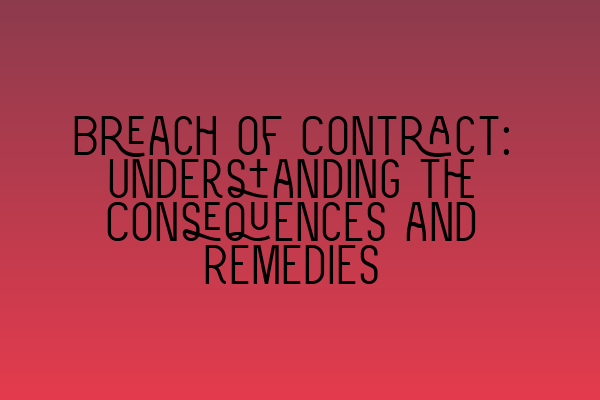Breach of Contract: Understanding the Consequences and Remedies
Contracts are a fundamental part of business and personal transactions, serving as legally binding agreements that protect the interests of all parties involved. However, there are instances where one party fails to fulfill their obligations, resulting in a breach of contract. In this blog post, we will explore the consequences of a breach of contract and the potential remedies available to aggrieved parties.
What is a Breach of Contract?
A breach of contract occurs when one party fails to perform any of the terms agreed upon in the contract without a valid legal excuse. This can manifest in various forms, such as:
- Non-payment: When one party fails to provide the agreed-upon payment or compensation.
- Non-performance: When one party fails to fulfill their obligations as outlined in the contract.
- Defective performance: When one party provides subpar or incomplete performance.
- Delay in performance: When one party fails to perform within the agreed-upon timeframe.
The consequences and potential remedies for a breach of contract depend on several factors, including the type of breach, the severity of the breach, and the terms specified in the contract itself.
Consequences of a Breach of Contract
When a breach of contract occurs, the non-breaching party can suffer various negative consequences. These may include:
- Financial loss: The non-breaching party may incur financial losses due to non-payment or subpar performance.
- Damage to reputation: A breach of contract can harm the non-breaching party’s reputation, especially if the breach was publicized or widely known.
- Disruption of business operations: In cases where the breach affects ongoing business operations, the non-breaching party may experience significant disruption and inconvenience.
- Legal expenses: Pursuing legal action to enforce the terms of the contract can result in substantial legal expenses.
Understanding the consequences of a breach is essential to determine the appropriate course of action and seek appropriate remedies.
Remedies for Breach of Contract
When a breach of contract occurs, the aggrieved party may seek various remedies to address the harm caused. Some common remedies include:
- Compensatory damages: This is the most common remedy, where the non-breaching party is awarded monetary compensation to cover the financial losses resulting from the breach.
- Specific performance: In some cases, the court may order the breaching party to fulfill their obligations under the contract. This remedy is often used when monetary compensation is not sufficient to address the harm caused.
- Rescission and restitution: In situations where the breach is severe, the non-breaching party may choose to cancel the contract and seek restitution for any expenses incurred.
- Injunctive relief: In certain circumstances, the court may grant an injunction to prevent the breaching party from taking certain actions or continuing with the breach.
The specific remedy sought will depend on the circumstances of the breach and the desired outcome of the non-breaching party.
Conclusion
A breach of contract can have serious consequences for all parties involved. Understanding the potential consequences and remedies is crucial for protecting your interests in any contractual relationship.
If you find yourself dealing with a breach of contract, it is advisable to consult with a qualified solicitor who specializes in contract law. They can provide expert legal advice, assess the merits of your case, and guide you through the process of seeking remedies.
For further insights into legal practice and decision-making, check out our article on real-life case studies. If you’re interested in learning about solicitor salaries in the UK and the factors that affect income, head over to our article on solicitor salaries.
Additionally, mastering client relationship management skills is essential for solicitors to enhance trust and loyalty. Read our article on client relationship management to learn more.
If you are considering a law school education in the UK and want guidance on choosing the right path for your future, our article on pursuing a law school education can provide valuable information.
Lastly, if you aspire to become a solicitor, securing training contracts is a crucial step. Check out our article on securing training contracts for a comprehensive roadmap to fulfilling your dreams.
